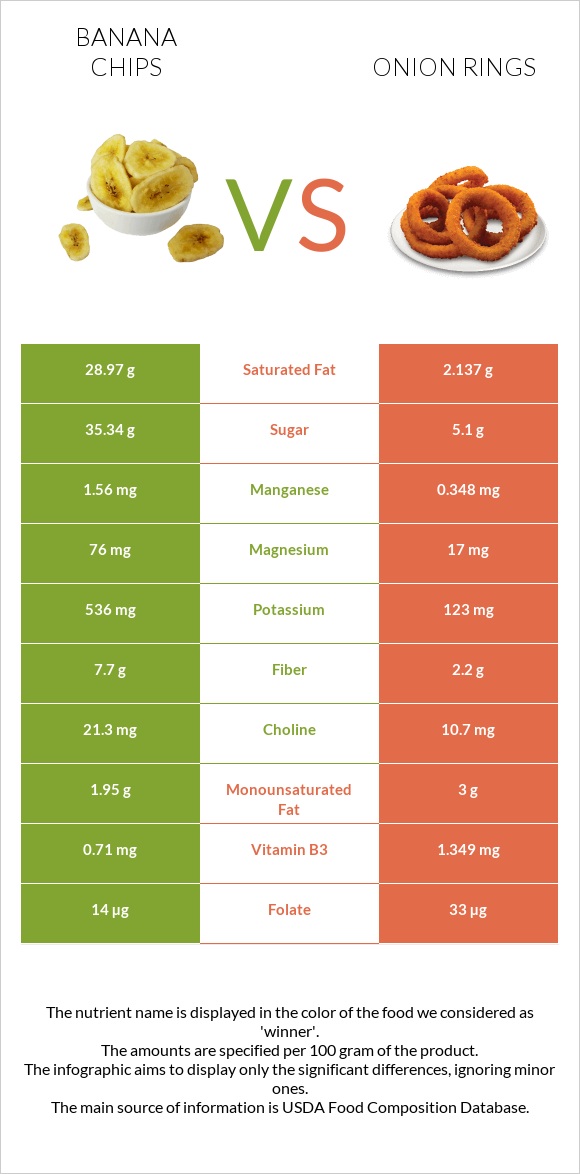Banana chips vs. Onion rings — In-Depth Nutrition Comparison
Compare
What are the main differences between banana chips and onion rings?
- Banana chips are richer in manganese, fiber, copper, magnesium, potassium, and vitamin B6, yet onion rings is richer in vitamin K and vitamin B1.
- Banana chips' daily need coverage for saturated fat is 134% higher.
- Banana chips have 4 times more manganese than onion rings. Banana chips have 1.56mg of manganese, while onion rings has 0.348mg.
- Onion rings contains less saturated fat.
We used Snacks, banana chips and Onion rings, breaded, par fried, frozen, prepared, heated in oven types in this comparison.
Infographic

Infographic link
Mineral Comparison
Mineral comparison score is based on the number of minerals by which one or the other food is richer. The "coverage" charts below show how much of the daily needs can be covered by 300 grams of the food.
| Contains more MagnesiumMagnesium | +347.1% |
| Contains more PotassiumPotassium | +335.8% |
| Contains more CopperCopper | +180.8% |
| Contains more ZincZinc | +78.6% |
| Contains less SodiumSodium | -98.4% |
| Contains more ManganeseManganese | +348.3% |
| Contains more CalciumCalcium | +72.2% |
| Contains more PhosphorusPhosphorus | +26.8% |
| Contains more SeleniumSelenium | +273.3% |
Vitamin Comparison
Vitamin comparison score is based on the number of vitamins by which one or the other food is richer. The "coverage" charts below show how much of the daily needs can be covered by 300 grams of the food.
| Contains more Vitamin CVitamin C | +293.8% |
| Contains more Vitamin AVitamin A | +∞% |
| Contains more Vitamin B5Vitamin B5 | +110.9% |
| Contains more Vitamin B6Vitamin B6 | +122.2% |
| Contains more Vitamin EVitamin E | +91.7% |
| Contains more Vitamin B1Vitamin B1 | +117.6% |
| Contains more Vitamin B2Vitamin B2 | +582.4% |
| Contains more Vitamin B3Vitamin B3 | +90% |
| Contains more Vitamin KVitamin K | +2523.1% |
| Contains more FolateFolate | +135.7% |
All nutrients comparison - raw data values
| Nutrient |  |
 |
DV% diff. |
| Saturated fat | 28.97g | 2.137g | 122% |
| Manganese | 1.56mg | 0.348mg | 53% |
| Polyunsaturated fat | 0.63g | 7.633g | 47% |
| Fats | 33.6g | 14.3g | 30% |
| Vitamin K | 1.3µg | 34.1µg | 27% |
| Fiber | 7.7g | 2.2g | 22% |
| Sodium | 6mg | 370mg | 16% |
| Copper | 0.205mg | 0.073mg | 15% |
| Magnesium | 76mg | 17mg | 14% |
| Calories | 519kcal | 276kcal | 12% |
| Potassium | 536mg | 123mg | 12% |
| Starch | 25.58g | 11% | |
| Vitamin B6 | 0.26mg | 0.117mg | 11% |
| Carbs | 58.4g | 33.79g | 8% |
| Vitamin B1 | 0.085mg | 0.185mg | 8% |
| Vitamin B2 | 0.017mg | 0.116mg | 8% |
| Selenium | 1.5µg | 5.6µg | 7% |
| Vitamin B5 | 0.62mg | 0.294mg | 7% |
| Vitamin C | 6.3mg | 1.6mg | 5% |
| Folate | 14µg | 33µg | 5% |
| Protein | 2.3g | 4.14g | 4% |
| Vitamin B3 | 0.71mg | 1.349mg | 4% |
| Zinc | 0.75mg | 0.42mg | 3% |
| Monounsaturated fat | 1.95g | 3g | 3% |
| Phosphorus | 56mg | 71mg | 2% |
| Choline | 21.3mg | 10.7mg | 2% |
| Fructose | 1.26g | 2% | |
| Calcium | 18mg | 31mg | 1% |
| Vitamin E | 0.24mg | 0.46mg | 1% |
| Net carbs | 50.7g | 31.59g | N/A |
| Iron | 1.25mg | 1.25mg | 0% |
| Sugar | 35.34g | 5.1g | N/A |
| Vitamin A | 4µg | 0µg | 0% |
| Trans fat | 0.053g | N/A | |
| Tryptophan | 0.027mg | 0.07mg | 0% |
| Threonine | 0.076mg | 0.15mg | 0% |
| Isoleucine | 0.074mg | 0.214mg | 0% |
| Leucine | 0.158mg | 0.35mg | 0% |
| Lysine | 0.107mg | 0.151mg | 0% |
| Methionine | 0.024mg | 0.081mg | 0% |
| Phenylalanine | 0.086mg | 0.243mg | 0% |
| Valine | 0.104mg | 0.216mg | 0% |
| Histidine | 0.18mg | 0.109mg | 0% |
| Omega-3 - ALA | 0.789g | N/A | |
| Omega-6 - Gamma-linoleic acid | 0.047g | N/A | |
| Omega-6 - Eicosadienoic acid | 0.003g | N/A | |
| Omega-6 - Linoleic acid | 6.346g | N/A |
Macronutrient Comparison
Macronutrient breakdown side-by-side comparison
Protein:
2.3 g
Fats:
33.6 g
Carbs:
58.4 g
Water:
4.3 g
Other:
1.4 g
Protein:
4.14 g
Fats:
14.3 g
Carbs:
33.79 g
Water:
46.37 g
Other:
1.4 g
| Contains more FatsFats | +135% |
| Contains more CarbsCarbs | +72.8% |
| Contains more ProteinProtein | +80% |
| Contains more WaterWater | +978.4% |
~equal in
Other
~1.4g
Fat Type Comparison
Fat type breakdown side-by-side comparison
Saturated fat:
Sat. Fat
28.97 g
Monounsaturated fat:
Mono. Fat
1.95 g
Polyunsaturated fat:
Poly. Fat
0.63 g
Saturated fat:
Sat. Fat
2.137 g
Monounsaturated fat:
Mono. Fat
3 g
Polyunsaturated fat:
Poly. Fat
7.633 g
| Contains less Sat. FatSaturated fat | -92.6% |
| Contains more Mono. FatMonounsaturated fat | +53.8% |
| Contains more Poly. FatPolyunsaturated fat | +1111.6% |





